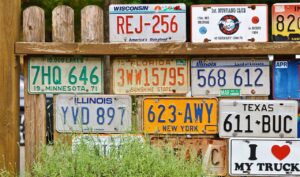Best Way to Find a License Plate Number by VIN
A license plate number is a unique identifier for vehicles on the road. Finding this number is important for various reasons, such as reporting a stolen vehicle, tracing a hit and run incident, or verifying a vehicle’s history.
This guide will explain how to find a license plate number by VIN – Vehicle Identification Number. This code contains important information about a vehicle and can help you get the corresponding license plate number. We’ll go through several methods, giving you step-by-step instructions and highlighting important things to consider so you can do this task effectively.
However, it’s important to remember that accessing license plate information may have legal restrictions and privacy concerns depending on where you live.
Section 1: Understanding VIN Numbers
When it comes to vehicle identification, a unique identifier known as the Vehicle Identification Number (VIN), plays a crucial role. A VIN is a distinctive code assigned to each vehicle when it’s manufactured. Like an automobile’s social security number, no two vehicles in operation have the same VIN. This unique set of characters is instrumental in distinguishing one vehicle from another.
What is a VIN Number and How Does it Work?
The VIN is composed of 17 characters (digits and capital letters) that act as a unique identifier for the vehicle. Its structure adheres to standards established by the International Organization for Standardization (ISO) in 1981. Here’s how it breaks down:
- Digits 1-3 form the World Manufacturer Identifier (WMI). They can tell you where a car was built and by which manufacturer.
- Digits 4-8 provide information about the vehicle itself, like model, body type, restraint system, and engine code.
- Digit 9 is a security check digit that verifies the VIN isn’t fraudulent.
- Digit 10 reveals the model year of the vehicle.
- Digit 11 indicates which plant assembled the vehicle.
- Digits 12-17 make up the vehicle’s unique serial number.
This intricate coding system encapsulates critical information about each vehicle and serves as an invaluable tool in tracking its history. From registration details to accident history, VIN numbers play an instrumental role.
Why Are VIN Numbers Important?
VIN numbers are not just codes; they carry an entire narrative of a car’s life within them. They are essential for revealing:
- Ownership transfers
- Recall notices
- Insurance coverage
- Whether or not a car has been stolen
Even if a license plate number is changed due to state relocation or other reasons, the VIN remains constant, allowing you to accurately track a vehicle’s history.
In our next section, we’ll delve into how you can leverage the power of these comprehensive identifiers to find license plate numbers. As we navigate these methods, it’s vital to remember the importance of respecting privacy laws and individual rights.
Section 2: How to Find License Plate Numbers by VIN
When it comes to finding license plate numbers from a Vehicle Identification Number (VIN), different approaches stand out. Let’s delve into them.
Method 1: Online License Plate Lookup Services
In the digital age, several online platforms offer license plate lookup services. These platforms have databases that contain VIN-related information, including license plate numbers. They use advanced technology to match the entered VIN with corresponding license plate details. Using these services is as simple as entering your VIN and running a search.
To guide you through the process:
- Select a reputable online service like Carfax or AutoCheck.
- Input the VIN in the designated search field.
- Click on ‘Search’ or ‘Submit’.
- Wait for the platform to fetch and display results.
However, while these services are convenient and accessible, they are not without drawbacks. They may require payment for detailed reports and accuracy can vary based on the comprehensiveness of their database.
Method 2: Contacting the DMV or Relevant Authorities
The Department of Motor Vehicles (DMV) or similar authorities in other jurisdictions can be a source of license plate information. By virtue of their role in vehicle registration, these entities have access to data linking VINs and license plates.
Here is how you can utilize this method:
- Identify the local DMV office or relevant authority in your area.
- Prepare necessary details such as your VIN and reason for inquiry.
- Some jurisdictions may require filling out a form or providing additional documentation.
- Pay any applicable fees.
However, remember that access to such data may be restricted due to privacy laws, so this approach might not always yield results.
Method 3: Hiring a Private Investigator
Private investigators, with their specialized skills and resources, can be hired to find a license plate number using a VIN.
This method involves:
- Identifying a licensed, experienced, and ethical private investigator.
- Providing them with the VIN and explaining your need for obtaining the license plate number.
- Paying their service fee.
Private investigators have access to databases and resources that are not readily available to the public, enhancing  the chances of successful searches. However, this method can be costly, and you must ensure the investigator operates within legal boundaries to avoid privacy violations.
the chances of successful searches. However, this method can be costly, and you must ensure the investigator operates within legal boundaries to avoid privacy violations.
Each method offers distinct advantages and potential challenges. Choose one that aligns best with your needs, budget, and legal obligations.
Section 3: Legal Considerations, Privacy Issues, and Other Ethical Aspects
When you’re trying to find a license plate number using a VIN, it’s important to remember certain legal considerations. Being aware of and following relevant laws is not just something you should do; it’s necessary to maintain trust, respect privacy rights, and make sure you’re acting ethically.
Legal Considerations When Finding License Plate Numbers
The specific legal considerations when searching for license plate numbers can vary depending on where you are. Most countries have strict laws about protecting data that’s connected to vehicle registration and how that information can be accessed and used. For example, in the U.S., there’s a law called the Driver’s Privacy Protection Act (DPPA) that limits public access to certain personal information held by state DMVs. While VINs aren’t directly covered by the DPPA, the information you might find using a VIN – like license plate numbers – could still be protected by these laws.
Note: Always consult with a legal expert or thoroughly research your local regulations before proceeding with your search.
Privacy Issues Associated With Using VINs
Now let’s talk about another important aspect – privacy issues related to using VINs. A VIN itself doesn’t reveal personal details, but it can be used to unlock such information. This possibility of invading someone’s privacy has raised concerns about VINs being misused for unethical purposes like stalking or harassment.
To address these privacy concerns in a responsible way, here’s what you can do:
- Make sure you have valid reasons for doing your search.
- If possible, get explicit permission before conducting the search.
- Don’t share any personal information you find during your search unless you have proper authorization.
Respecting people’s privacy rights is just as crucial as finding the information you’re looking for. Remember, every piece of data connected to a person has the potential to significantly impact their life. That’s why it’s important to make ethical decisions throughout this process.
Guidelines for Ethical Decision-Making
Here are some guidelines to help you make ethical decisions when searching for license plate numbers:
- Legitimate Purpose: Only go down this path if you have valid reasons, like verifying vehicle details for a sale, addressing legal issues, or similar situations.
- Minimum Necessary Rule: Limit your search to only the information that’s necessary for your purpose and avoid delving into unnecessary personal details.
- Respect Consent: If you come across someone’s personal data through your search, respect their right to privacy and keep it confidential.
By following these guidelines, you can balance your need for information with a consideration for privacy rights. The general rule here is simple – just because you can access certain information doesn’t mean you should.
Section 4: Tips for Successful and Responsible License Plate Number Searches
In the journey of finding a license plate number using a VIN, certain strategies can heighten your success rate. These tips not only enhance the accuracy of your results but also ensure you conduct your search responsibly.
Tip 1: Double-check the Entered VIN
The accuracy of a VIN is paramount in yielding correct license plate information. A single misplaced digit or letter can lead to inaccurate results or even render the whole search process futile. Therefore, always double-check the entered VIN.
Consider verifying the VIN from multiple sources like vehicle registration documents, insurance paperwork, or directly from the car itself—usually found on the driver’s side where the dashboard meets the windshield. Remember, it’s not unusual to find discrepancies between these sources due to human error. Hence, be sure to cross-verify for congruency.
Tip 2: Use Multiple Reputable Sources
Just as with any research process, utilizing multiple sources increases your chances of obtaining reliable results. This approach allows for data cross-verification and helps identify any inconsistencies.
When selecting online lookup services or private investigators, pay attention to their reputation and reviews. Seek out services that are known for their accuracy and data integrity. Also, be wary of free services; they often provide outdated or incorrect information.
Remember to compare your findings from different sources. If there’s a discrepancy in the obtained data, it might indicate an error in one of your sources.
Tip 3: Understand Limitations and Restrictions
Each method used to find a license plate number by VIN comes with its own set of limitations and restrictions—imposed by service providers or legal regulations.
For instance, some online lookup services may limit the number of searches you can conduct within a certain timeframe. Others may restrict access to certain types of information.
Legal regulations vary by jurisdiction—some allow public access to certain vehicle information, while others restrict it due to privacy concerns. Therefore, take time to familiarize yourself with these limitations and restrictions.
In case of any doubts or ambiguities, consider seeking legal advice to ensure your actions align with the law. Noncompliance can lead to legal complications and penalties.
By following these tips, you’ll enhance your chances of running a successful VIN-to-license-plate search. At the same time, this approach ensures that you remain within ethical and legal boundaries during the process.
Conclusion
The journey to Find License Plate Number by VIN: Ultimate Guide for 2024 has been an informative one. It covered the basics of understanding VIN numbers, methods to find license plate numbers, and provided practical tips for successful searches.
Respecting Privacy and Using Methods Responsibly
Respecting privacy should always be at the forefront of this process. We have to remember that while we are sifting through data, we are dealing with sensitive information linked to individuals’ security and confidentiality. Hence, it is essential to stick to applicable laws and regulations in your jurisdiction while conducting a license plate number search based on a VIN.
Use the methods shared in this guide responsibly. If you feel your search purposes might not be justified or infringe on someone’s privacy rights, consider exploring legal alternatives. Before deciding on a method, ensure you have a legitimate reason such as verifying vehicle details or addressing valid concerns.
Unauthorized access to license plate information is strictly prohibited. Methods described in this guide are intended for lawful use cases only. Any misuse can lead to legal consequences, damaging reputations and trust.
Upholding Transparency and Privacy Rights
As we navigate through the digital age, transparency and respect for privacy rights emerge as foundational values. Let these principles guide your actions as you utilize the information obtained from VINs. This guide hopes that its readers will adhere strictly to these principles while using any of the methods discussed herein.
The ultimate goal isn’t just about finding a license plate number by VIN; it’s also about doing it the right way—the respectful, ethical, and legal way.



